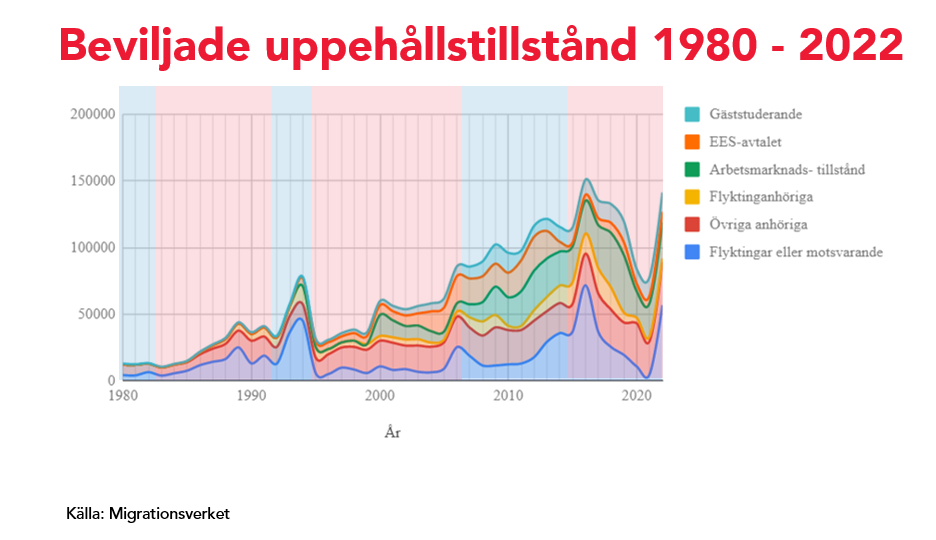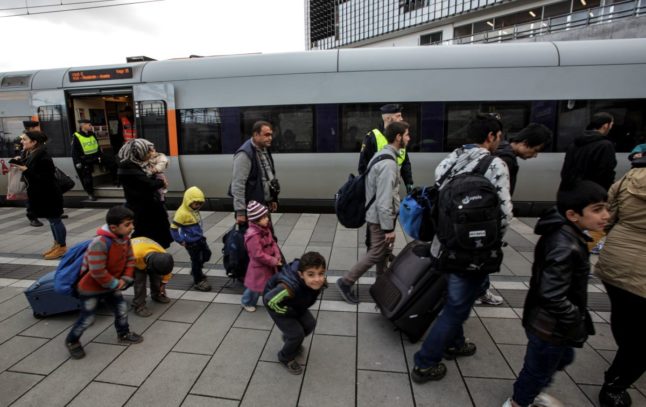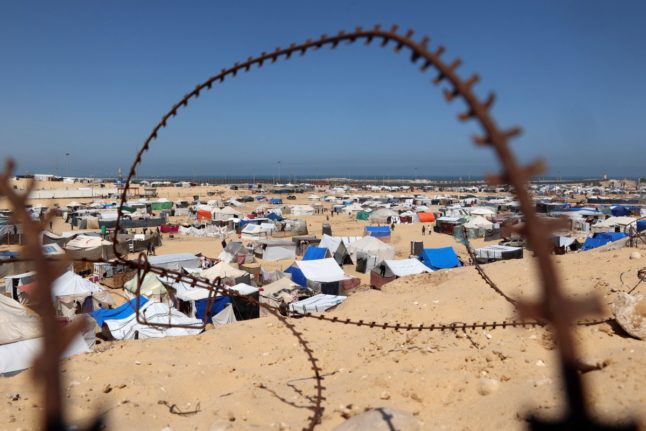At a fika coffee meeting with journalists on Thursday, Social Democrat party secretary Tobias Baudin said Kristersson had been a minister when the Moderate Prime Minister Fredrik Reinfeldt pushed through some of the migration laws that contributed to the high levels of migration between 2014 and 2022.
These included, he said, a radical liberalisation of work permit rules and an asylum deal with the Green Party which introduced the spårbyte, or “track change”, system that allowed rejected asylum seekers to apply for a work permit instead.
“Ulf Kristersson is evading his own responsibility and the responsibility of the Moderate Party for the migration policy of the past,” Baudin said. “Ulf Kristersson should apologise and be self-critical”.
Migration minister Maria Malmer Stenergard, also from the Moderate Party, then accused the Social Democrats of attempting a “falsification of history”, countering that the previous Social Democrat-led government had in 2020 further relaxed the rules on family reunification.
Migration has arguably been beneficial to Sweden in many ways. But now Sweden’s two main parties are each accusing the other of letting too many people come to the country, which one is right?
Which party has presided over the most migration?
The number of refugees arriving in Sweden started to rise sharply under the Moderate-led Alliance government between 2006-2014, and then hit record levels under a Social Democrat-led government during the 2015-2016 migration crisis.
While the Social Democrat-Green coalition arguably could have acted faster to tighten migration laws in 2015, as governments did in Norway and Denmark, there is little doubt that the Moderates would have faced a similar situation had they won the 2014 election.
If you add up the total numbers over the whole period between 1967 and 2022, around 2.47 million people have migrated to Sweden under a Social Democrat prime minister, and about 1.16 million under a Moderate one.
If you then average out the migrants who have come each year, though, the Moderates are ahead, with an average of 89,100 a year, to the Social Democrats' 66,700 a year.
Both these figures are pretty meaningless, of course, with the first primarily reflecting the number of years the Social Democrats have been in power, and the second the fact that a disproportionate number of the Moderates' years in power came after immigration levels started to rise in 2006.
Also, major conflicts such as the Bosnian war of the early 1990s, the 2003 Iraq War, and the 2011 Syrian Civil War have arguably played a bigger role in the number of migrants than which party was leading Sweden's government at the time.
Which party has brought in the most liberal migration and asylum laws?
Arguably the key decisons which made Swedish asylum law generous were the introduction of Permanent Residency (PR) in 1976, and then in 1984, when PR became the default status for anyone granted asylum.
"The reforms made Swedish policies on permanent residence permits relatively generous in relation to other European countries," wrote Tobias Andersson, a researcher at Gothenburg University with a focus on the history of migration law, in a 2023 study.
While these reforms were both drawn up and enacted under the Social Democrat prime minister Olof Palme, no Moderate or Centre Party prime minister did anything to reverse them for 31 years.
"The Swedish state upheld the standard for permanent residence permits between 1985 and 2016," Andersson wrote.
This did not mean, however, that there were never any efforts to tighten migration.
In 1989, when there was a 50 percent rise in asylum applications, the then Social Democrat government decided to temporarily limit the right of asylum only to those fulfilling the Geneva Convention’s criteria and to those with an extra need for international protection.
According to an article by Hans Andersson at Södertörn University, the Moderates were at that point the more liberal party, pledging on taking power in 1991 to return to the earlier more generous approach.
When the Bosnian war led to a surge in refugees, however, they also took action, insisting that Bosnian citizens needed a visa to enter Sweden, leading to a sharp drop in the number of applications.
By the middle of the 2000s, with the rise of the anti-immigration Sweden Democrats, the consensus of the established parties began to become more liberal, however.
In 2005, the then outgoing Social Democrat government passed a temporary law, valid between 15 November 2005 and 31 March 2006, which gave an amnesty to about 15,000 people whose asylum applications had been rejected but who had not left Sweden. Many of those granted asylum were families who had fled Iraq after the war in 2003.
The Moderates voted against this law, but it was backed by its allies, the Christian Democrats, the Liberals and Centre Party.
In 2008, the Moderate-led Alliance government brought in a new policy on labour migration, which scrapped the old system of labour market testing, under which unions and employers agreed on a list of skills and jobs in short supply in Sweden.
At their press fika, Baudin and Ygeman projected a slide showing that increased labour migration had contributed significantly to the number of migrants arriving in Sweden.
You can see the slide below. Work permits are in green.

In 2011, the Alliance government struck a new migration agreement with the Green Party, which made it easier for people who have had their asylum claims rejected to stay in Sweden. As well as creating the spårbyte mechanism allowing them to to apply for a work permit, it also gave the children of paperless migrants the right to go to school and receive healthcare.
In the autumn of 2015, Sweden's Migration Agency was overwhelmed by the number of Syrian and Afghan refugees crossing over from Denmark and Germany, pushing the then Social Democrat and Green government to announce plans to temporarily stop giving those granted asylum a permanent right to live in Sweden.
This ended the practice brought in back in 1984, meaning the Social Democrats have a point when they say they presided over the true "paradigm shift" on migration. The law was then passed in June 2016, with the change made permanent in the 2021 migration law.
Malmer Stenergard is right that as part of the price for winning the Green Party's backing for a new Migration Law, the Social Democrats agreed to slightly loosen the rules around family reunification.
Which party has had the most liberal rhetoric?
The former Moderate Prime Minister Fredrik Reinfeldt made the most impassioned call for a generous asylum policy in his 2014 speech when he called on Swedes to "open your hearts" to the refugees then on their way to Sweden from Syria.
His Social Democrat successor Stefan Löfven made a similar speech in the middle of the 2015 refugee crisis when he declared "in my Europe, we don't build walls".
But even Ulf Kristersson himself has a pro-migration history.
At the time that he was appointed to lead the Moderate Party's youth party, he was a passionate campaigner for minimal border controls.
"The future has no borders," he told an interviewer in the late 1980s. "We want all borders to be open and we want to work for all countries to have as few borders as possible. It's not the state who should limit people's lives."
Even in 1998, at the end of his first term as an MP, he presented a motion to parliament calling for more liberal migration.
”The possibilities for foreign citizens, who aren't refugees, to come to our country should be expanded," he wrote. "It would benefit everyone greatly if it became easier to immigrate to Sweden without needing to show you are a refugee."
The fact is that both the Social Democrats and the Moderates were liberal on asylum between around 2000 and about 2014, with both then shifting to a tougher, more restrictive approach.



 Please whitelist us to continue reading.
Please whitelist us to continue reading.
I came here to work for good and directly contribute and integrate into Swedish society, yet I can only get a 2 year permit that has to be renewed. Someone coming under refugee status, who is supposed to return to their home country after some time has passed, automatically gets permanent? Why the unequal treatment?